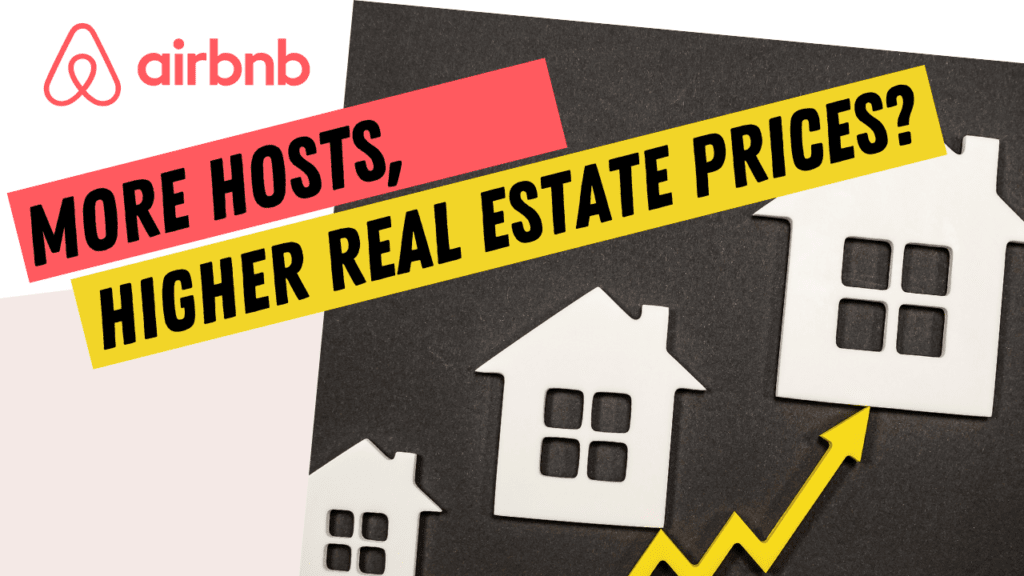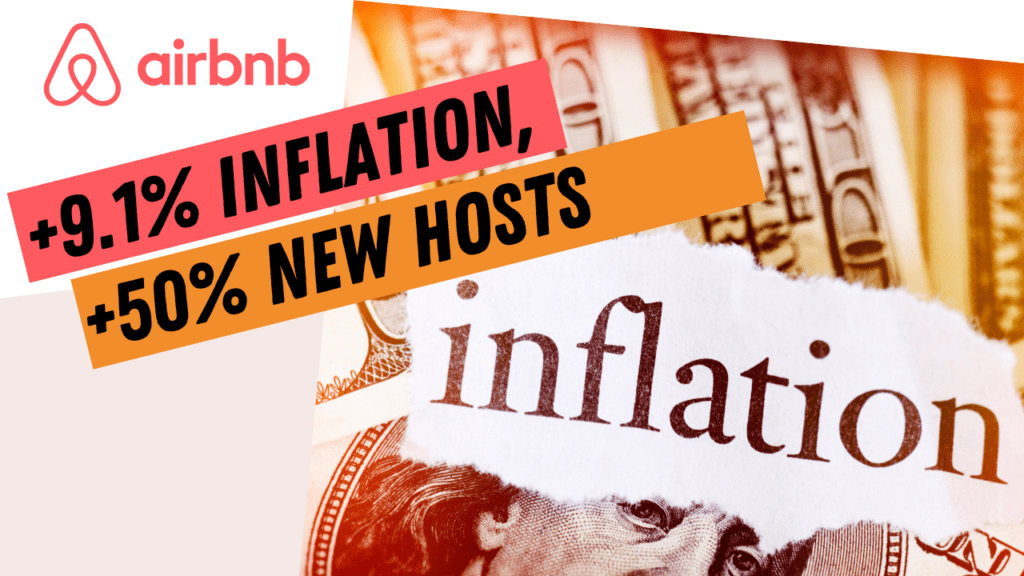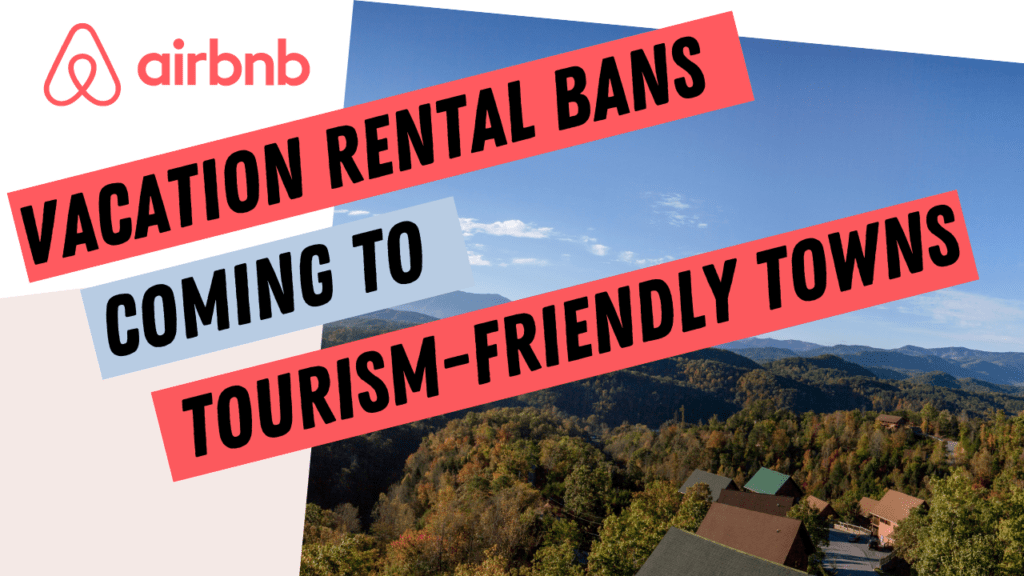Are we stuck in a vicious cycle? Airbnb says that people are turning out in droves to become new Airbnb hosts (+50% new hosts in the US in Q2 2022), as they need money to pay for more expensive mortgages. Airbnb sees it as a positive for the company, but others point out that the listing platform is helping drive up real estate prices and rents. Airbnb has published some numbers to show a correlation between high inflation and an increase in new hosts. We’ll see whether this correlation is real and ponder whether it is detrimental to the image company.
Municipalities in big and small towns are blaming Airbnb for fueling the lack of affordable housing for owners and renters. In destinations previously thought to be vacation rental-friendly, bans on new short-term rentals are popping up. For example, workers in the Smoky Mountains cannot find places where they can live close to their jobs.
High inflation and the affordable housing crisis lead to renewed criticism
It is not the first time that Airbnb has been accused of driving up real estate prices and rents. Yet, as inflation rises and the affordable housing crisis deepens, new press articles about the issues pour in daily. For instance, in just the last few days, you could read the following:
- (US) Arizona city to pay Airbnb hosts $10K to rent longer-term to locals
- (Ireland) Three times more Airbnb rooms than long-term rentals for student
- (Australia) ‘Bad news for renters’: Landlords chasing big dollars with AirBnB
- (Australia) Airbnb listings outnumber vacant rentals by more than 40 to one in many regional WA towns
Meanwhile, Airbnb boasts that new hosts are turning to hosting to pay for higher mortgages. In a situation of lack of affordable housing, how does it all make sense? What if all these things were true at the same time?
Airbnb says: “More people start hosting as inflation increases”
Airbnb says that its number of new Hosts is increasing tremendously (+50% in one year in the US, +40% in the UK, +30% in Australia). Now, let’s make sure that we’re reading this number correctly. It is an increase of 50% of new hosts compared with the numbers of new hosts who joined the year before. It is not the overall number of hosts that is jumping by +50%!
The company says a correlation between inflation and the increase in new hosts on its platform:
A 1 percentage point increase in the inflation rate in a top Airbnb market was correlated with a nearly 4 percentage point increase in the number of new Hosts in that country for Q2 20222.
Here are other data points that Airbnb shared to show a supposed correlation between increased inflation and a rise in new hosts:
- The United States, with a 9.1% increase in inflation in June 2022 and a more than 50% increase in new Hosts in Q2 2022;
- Brazil, with an 11.89% increase in inflation in June 2022 and a more than 50% increase in new Hosts in Q2 2022;
- Spain, with a 10.2% increase in inflation in June 2022 and a nearly 70% increase in new Hosts in Q2 2022;
- Ireland, with a 9.1% increase in inflation in June 2022 and more than 50% increase in new Hosts in Q2 2022;
- The United Kingdom, with a 9.4% increase in inflation in June 2022 and more than 40% increase in new Hosts in Q2 2022;
- Canada, with an 8.1% increase in inflation in June 2022 and a nearly 100% increase in new Hosts in Q2 2022;
- Italy, with an 8% increase in inflation in June 2022 and more than 60% increase in new Hosts in Q2 2022;
- Mexico, with a 7.99% increase in inflation in June 2022 and more than 40% increase in new Hosts in Q2 2022;
- Germany, with a 7.6% increase in inflation in June 2022 and more than 70% increase in new Hosts in Q2 2022;
- New Zealand, with a 7.3% increase in inflation in June 2022 and more than 30% increase in new Hosts in Q2 2022;
- Australia, with a 6.1% increase in inflation in June 2022 and more than 30% increase in new Hosts in Q2 2022;
- South Korea, with a 6% increase in inflation in June 2022 and more than 40% increase in new Hosts in Q2 2022; and
- France, with a 5.8% increase in inflation in June 2022 and a more than 30% increase in new Hosts in Q2 2022.
Airbnb says people become new hosts to make up for mortgages rising due to higher interest rates. How about higher real estate prices and higher rent in Airbnb-heavy destinations?
On social media, quite a few people have pointed out that Airbnb may be the cause for the increase, not the solution to high inflation in real estate prices.
Yet, Airbnb has been careful to mention mortgage costs and rising interest rates. The company does not mention rising real estate prices or higher rents in travel destinations, which one could more directly link to Airbnb’s surge in key markets.
For instance, Airbnb says that many people start hosting to pay their mortgage in a climate of rising homeownership costs so they can stay in their homes.
Hosts around the world have long shared that hosting helps them to afford their home – with the need to pay for their mortgage or rent even serving as a reason why many began hosting in the first place. According to an Airbnb survey, nearly 40% of Hosts in the US said that the income earned through hosting has helped them stay in their home in 20214.
Now, with the cost of homeownership rising, new Hosts in the US are not only turning to hosting, but also may be hosting more frequently once they get started, to increase their earning potential and cover a larger mortgage.
Is Airbnb mixing up correlation and causation? And what if the cause (higher mortgaged costs) was actually a consequence of houses turning into vacation rental homes?
Note that Airbnb only mentions the mortgage costs and higher interest rates. It does not mention rising real estate prices. The company does not mention the higher rents for people who are not owners in these booming vacation rental markets. Also, the Airbnb article does not mention those new hosts that do not live in these houses but are investing in secondary homes.
So, Airbnb’s article about new hosts turning to hosting to make money and regain some purchasing power is well-written. Yet, it avoids considering other factors more linked to the rise in short-term rental demand and supply, which could be more directly related to Airbnb’s rise in these destinations.

Housing crisis not just in big cities but in the Smoky Mountains too
Before COVID-19, it was mainly large cities that were complaining about Airbnb. The rise of short-term rentals in urban markets was supposed to take away affordable housing. On the other hand, traditional vacation rental markets (sea, mountain, countryside) that lived from tourism revenues were supposed to be less restrictive.
In large cities, the push to restrict short-term rentals further is still going on. For instance, in July 2022, a group of large European cities wrote to the European Commission to ask for swifter European Union-wise measures. The representatives of Amsterdam, Arezzo, Barcelona, Berlin, Bologna, Brussels, Budapest, Florence, Krakow, Lyon, Munich, Paris, Prague, Porto, Utrecht, Valencia, Vienna, and Warsaw stated:
We are writing to you as Members of the European Parliament and as representatives of some of the biggest cities in Europe, united in the European Cities Alliance on Short Term Rentals and
beyond, to share our concern on the impact of the expansive growth of short-term holiday rentals (STHR) and the urgent need for action and regulation at EU level. Cities have repeatedly been calling for action on tackling illegal STHR and the European Parliament called on the Commission on January 21st, 2021 in its Resolution on access to decent and affordable housing for all to take legislative measures on short-term rental.
Yet, during the pandemic, when travelers dropped urban destinations and surged to more remote destinations. The affordable housing crisis has extended to areas that were vacation rental-friendly until then.
For instance, the AP article “Amid housing crises vacation towns limit short-term rentals” shows that workers have piled up in converted motels to stay close to their jobs. This is an issue that Steve Trover from Better Talent underlined in our conference about labor shortages in the vacation rental industry: Some people who work in the hospitality industry cannot afford anymore to live near their jobs. They have to drive several hours each day, even in remote markets. Steve said, in a way, that our industry is creating its own problem.
The AP article has interesting data:
- Airbnb listings outside of major metro areas rose by nearly 50% between the second quarter of 2019 and 2022,
- Figures from analytics firm AirDNA and the U.S. Census Bureau show nearly 30% of homes in Steamboat Springs are vacation rentals,
- In six Rocky Mountains counties, including Steamboat Springs’ Routt County, a wave of wealth flooded towns, with nearly two-thirds of 2020 home sales going to newcomers, most making over $150,000 working outside the counties.
Consequently, in June 2022, the Steamboat Springs City Council passed a ban on new short-term rentals in most of the town and a ballot measure to tax the industry at 9% to fund affordable housing.
Now, as short-term rental professionals, we may find it normal that, in a tourism destination, a lot of the supply of houses is for travelers. This is what the destination lives from. Yet, the article underlines that what is missing is building affordable housing for the residents, not just chalets, lodges, cabins, and treehouses.
Yet Airbnb seems to recognize that it may impact “affordable housing” and drive up “speculation”
In some cases, Airbnb has to work with local authorities to correct its image. Note that most of the flack goes to Airbnb, not Vrbo and Booking.com, even if they benefit from the rising supply of short-term rentals. So, Airbnb is the one who has to take some action, more or less voluntarily.
For instance, on its French-language blog, Airbnb has just published an article titled: “Airbnb commits to fighting real estate speculation in La Baule”. The city of La Baule has been welcoming guests in vacation rentals for decades. Yet, the municipality has voted that owners of more than two short-term rentals in the city should also prove that they are investing in housing for residents.
So, on its blog, Airbnb uses the word speculation. The article says that Airbnb supports the desire for cities to have effective regulatory tools to prevent real estate speculation in travel destinations and calls on national regulations.
This is what an Airbnb rep stated: Individual owners of second homes have been contributing to traveler accommodations for decades and will always be welcome on Airbnb, but we believe it is our responsibility to ensure that municipal efforts to build more affordable housing for residents are not hindered by unwanted real estate speculation.
In the UK, you can read that “Airbnb (is) to help London council catch social housing sub-letters”
A West London council, which has 3,000 families on its housing list, said it hoped the scheme would free up homes for those in need of housing.
“There is a huge demand for social housing in our borough and it’s simply not fair that people in genuine need are being denied a place to call home because others are illegally subletting their council properties to make money,” said one Council representative.
So, from villas on the Atlantic Coast in France to social housing estates in London, Airbnb is taking some action. Yet, is it really on the scale of the issue? Is saying that high inflation is good for Airbnb as it drives up host numbers and that the company is chasing fraud in British council estates such savvy PR moves?









